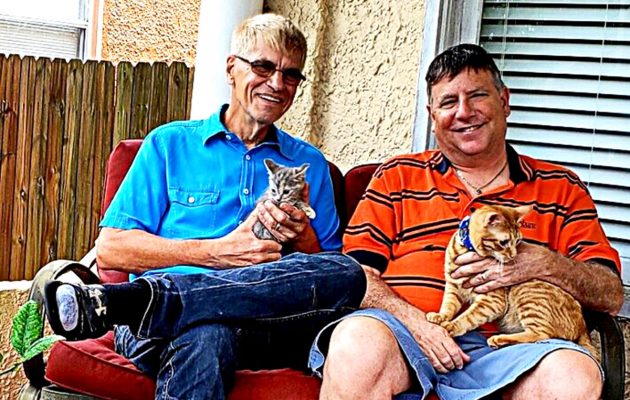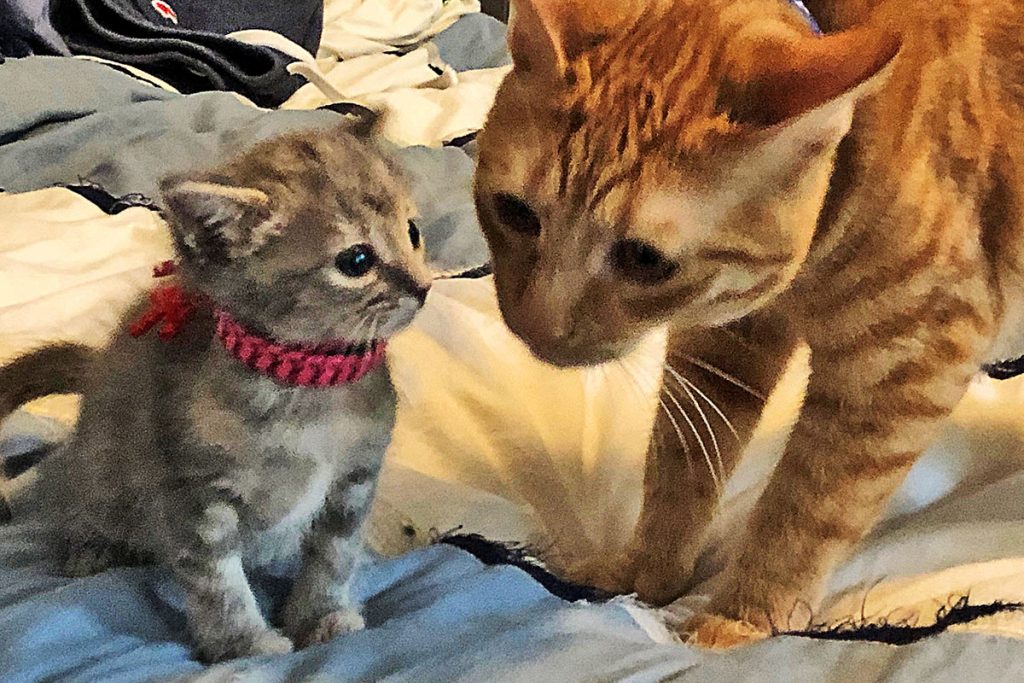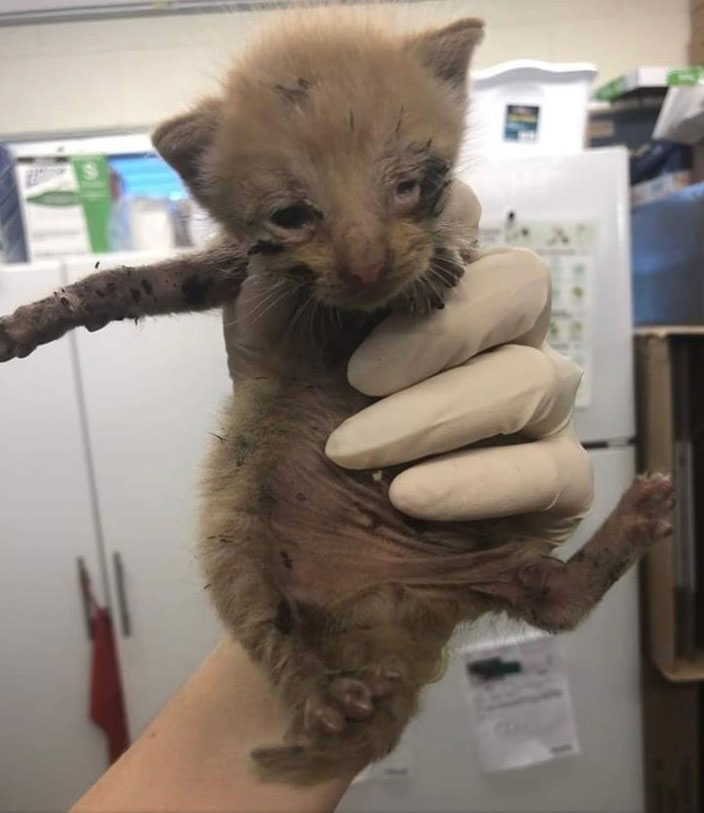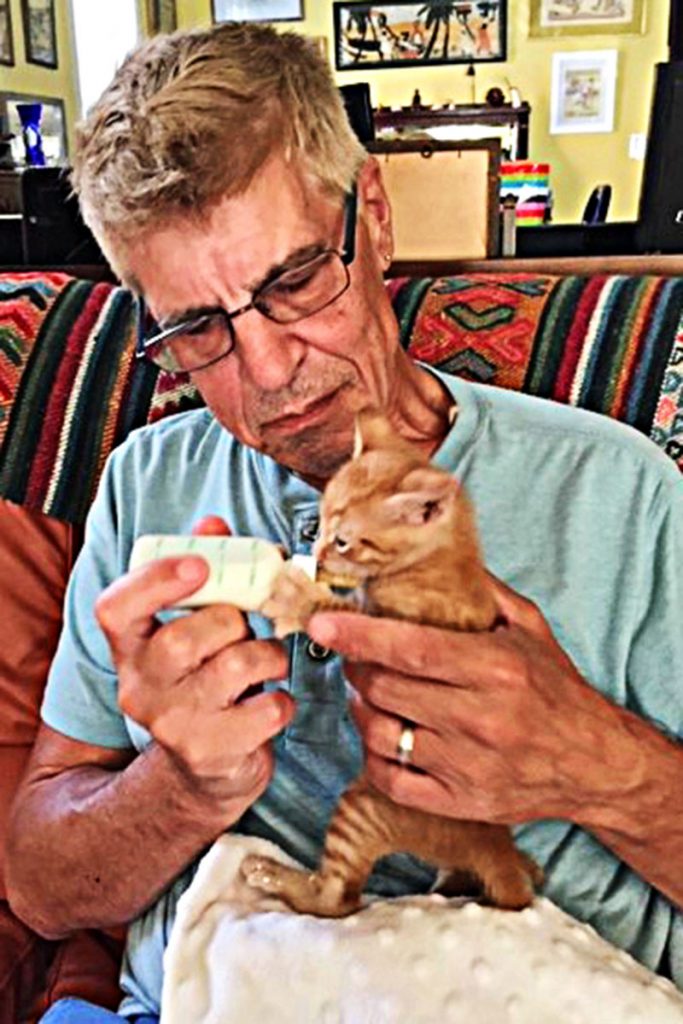Riverside fosters restore health to two ‘miracle’ kittens

Whether it’s an orphaned kitten that rode 38 miles on the frame of a tractor-trailer truck or a “COVID” orphan kitten, three days old, found in critical condition, only a truly dedicated foster-to-adoptive family could handle these two: Juan Vegega and Hardee Mahoney of Riverside.
No one knows how the first orphan, a two–week-old male orange tabby kitten, survived the truck ride from Lawtey to Jacksonville. Miraculously, when the truck driver stopped, he heard wailing and rushed the badly dehydrated kitten to Duval County Animal Care & Protective Services (ACPS). The ACPS dream team painstakingly extracted the tiny hitchhiker from caked-on layers of grease, road dirt and grime.
ACPS kitten fosters Pam Newby Love and her husband, Russell, of Avondale, worked their magic and continued the intensive care begun by ACPS to nurture the newborn. When their friends, Riverside residents Vegega and Mahoney heard the orange kitten’s story, they could not wait to meet him.

“It was love at first sight when Juan and Hardee met the ‘truck kitten’. They came to visit him every other day to see how he was doing. They have the biggest hearts and care so much for animals,” Love said. “They decided to apply to become ACPS fosters with the intent to learn how to care for orphan kittens, and to eventually adopt him.” The Loves taught the couple orphan kitten care and Ryder was soon named.
Not only did Vegega and Mahoney instantly click with Ryder, to their surprise, so did their 15-year-old rescue cat Gus. Although Gus recently passed, both men recall how Ryder, a daredevil who rips through the house at break-neck speed combined with hair-raising vertical leaps, always joined Gus for leisurely window-watching or porch-sitting.
“We all fell in love with Ryder. It was completely weird how well he immediately got along with our Gus and how they even looked alike: two gorgeous orange-colored cats. During the time they had together, Ryder was absolutely his mini-me,” Vegega said. “Ryder definitely has his quirks though. He is mesmerized by weather maps and radar tracking and sits at attention to watch Tim Deegan, First Coast News meteorologist.”

With the loss of Gus and their delight with Ryder, it was no surprise that foster-to-adopt rescue kitten number two soon caught the couple’s interest. Zoey, (short for Zosime, which is Greek for “survivor”), was a “COVID” kitten, approximately 9 days old. She was found with her sibling who did not survive. Despite her terrible condition and double-eye infection, the gray, blue-eyed kitten’s instinct to live was so strong, she attacked the bottle and even tolerated baths.
A “COVID” kitten or puppy is a pandemic-inspired description of a situation directly caused by the Coronavirus community restrictions. Animal rescuers coined the phrase to describe orphans left outside much longer than usual without nourishment, because fewer people are active outdoors to find and save them. The “COVID” orphans arrive at shelters or veterinarian offices much weaker, often ill or with advanced infections, flea or parasite infestations. These orphans face a higher mortality rate and rougher road to full recovery.
“Zoey has been something else. She is precocious, weaned herself at 4 weeks and steals food right off the plate; steamed asparagus is her absolute favorite. She also likes pork buns from S & R Dim Sum in 5 Points, kielbasa sausage and even cheese pierogi!” Vegega said. “She and Ryder play wonderfully together, but when he grabs her toys, tiny Zoey puts 9-pound Ryder right in the corner.”
Although they have had three sets of rescue cats share their lives during their 30 years together, the couple had never fostered or bottle-fed newborn kittens. According to their more experienced foster friends, they have learned to successfully nurture orphaned, neonate kittens into pudgy, playful dynamos.

“They were in heaven! So excited to learn how to foster and bottle-feed
Ryder and totally thrilled with his every milestone and watching him thrive and now they’ve successfully added Zoey to the family,” Love said.
Married since 2014, Vegega and Mahoney moved to their 1926 Spanish bungalow in Riverside in December 2017 from Washington, D.C. They relocated back to Mahoney’s hometown after Vegega’s retirement, to help care for Mahoney’s mother, Olive Fleming Mahoney. Olive, 93, still lives in the family’s Ortega Forest home. Her late husband was Bill Mahoney, an engineer who worked for Reynolds, Smith & Hill (now RS&H, Inc.). Olive worked at Lord’s in the shops of Avondale for years, but now enjoys quiet days spent with her adopted ACPS cat, Twinkles. Both of Mahoney’s parents grew up in homes approximately four blocks from the couple’s bungalow. The Mahoney family has been in Northeast Florida for generations.
Mahoney’s brother, David, lives in Riverside. David’s son, local professional artist Caleb Mahoney, his wife, Jennie Crosby Hugo (Riverside’s Crosby Designs), and their son Oliver, 1, (named for great-grandmother Olive), live in Ortega. David’s daughter Kylie Mahoney and her partner, Bradley Turner, and their son, Hudson, 4, live in Venetia.
Hardee Mahoney works as a computer consultant for ABT Associates and participates in a classical Greek study group that originated at Georgetown University, but now meets remotely online. Vegega, retired from a 31-year career in mortgage finance, enjoys gardening, cooking and monthly First Coast Tiger Bay club meetings that discuss current events. Together they enjoy worldwide travel, especially trips to Argentina where Vegega still has family. Members of the Episcopal Church of the Good Shepherd, they support local businesses, charities, and cultural organizations, including PFLAG of Jacksonville Scholarship Program, Cummer Museum, Riverside Avondale Preservation, WJCT, Florida Theatre, and the FSCJ Artist Series.
Anyone can learn to foster kittens that are already eating and drinking on their own, that may simply need to gain weight. There is always an ongoing shortage of fosters willing to learn to bottle-feed (must be fed every two-three hours round-the-clock), or care for “mushers.” “Mushers” are kittens transitioning from liquid formula fed by syringe or bottle, to softened, mushy kitten chow or moist canned food mixed with water or formula. Next, the youngsters graduate to eating soft food, then hard kibble and drinking on their own. During normal times, ACPS and the Jacksonville Humane Society offer free classes and training for interested potential kitten fosters.
Fosters agree to transport their foster animals to veterinarian appointments for vaccines and spay or neuter surgery, all which must be completed prior to adoption. After an animal recovers from sterilization surgery, their foster parent may choose to adopt or return the animal to the shelter where it becomes available to the public for adoption. All fosters are encouraged to publicize their foster animals and work to find adoptive homes whenever possible to help reduce the population that must be housed at any of the local shelters. Check each shelter’s website for complete foster information, current needs and temporary changes to hours of operation.






